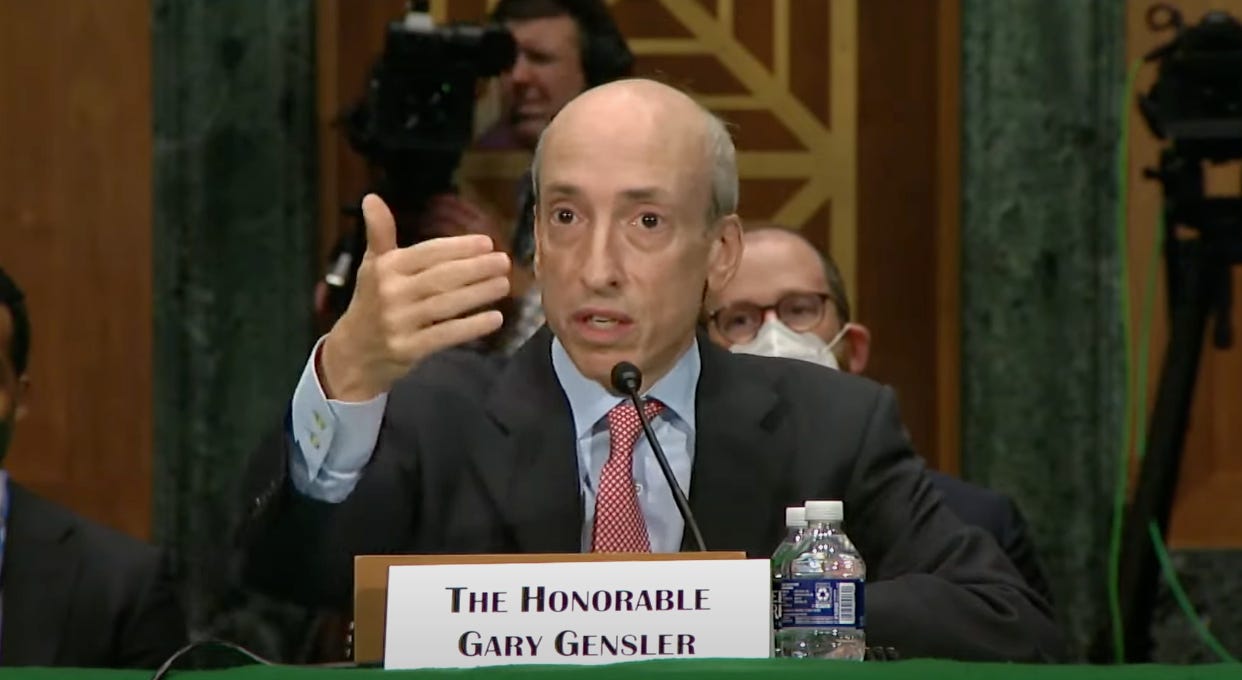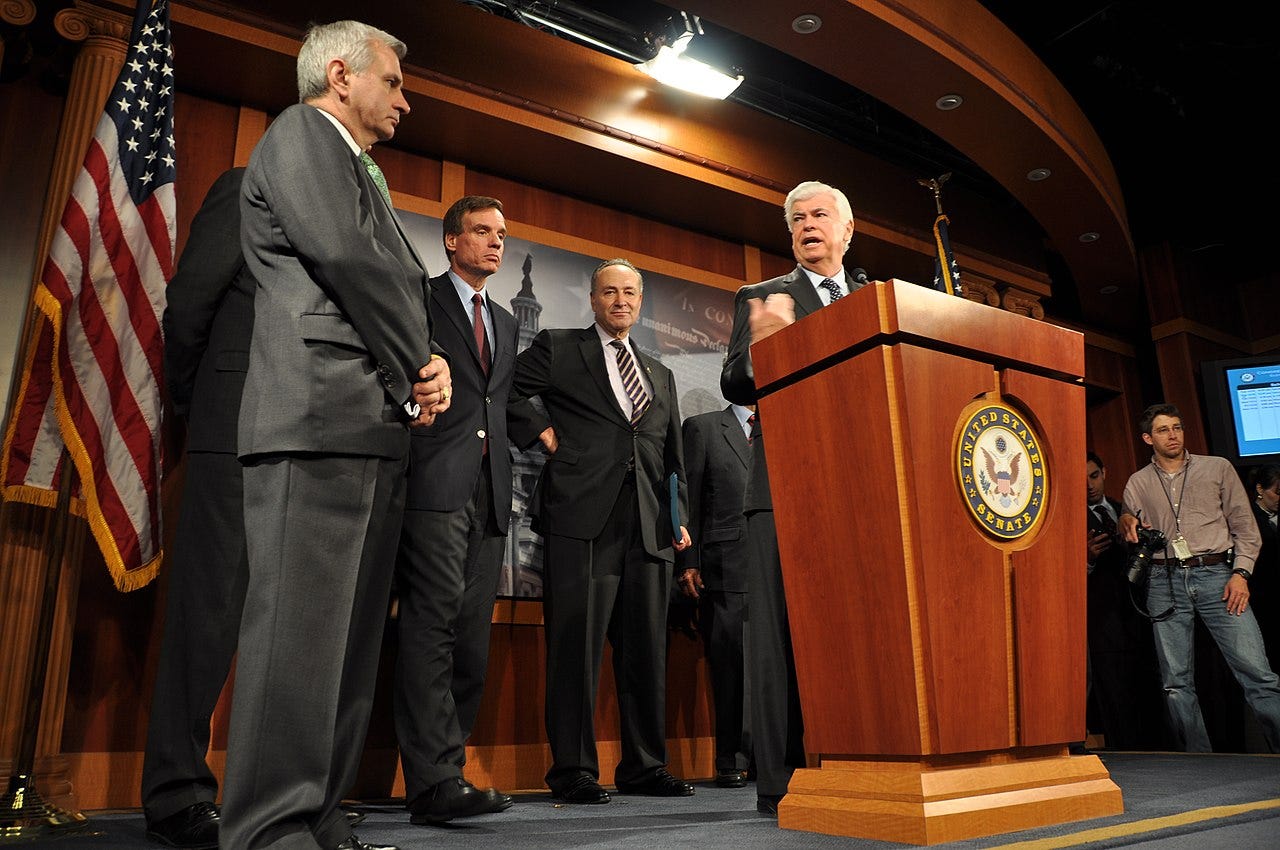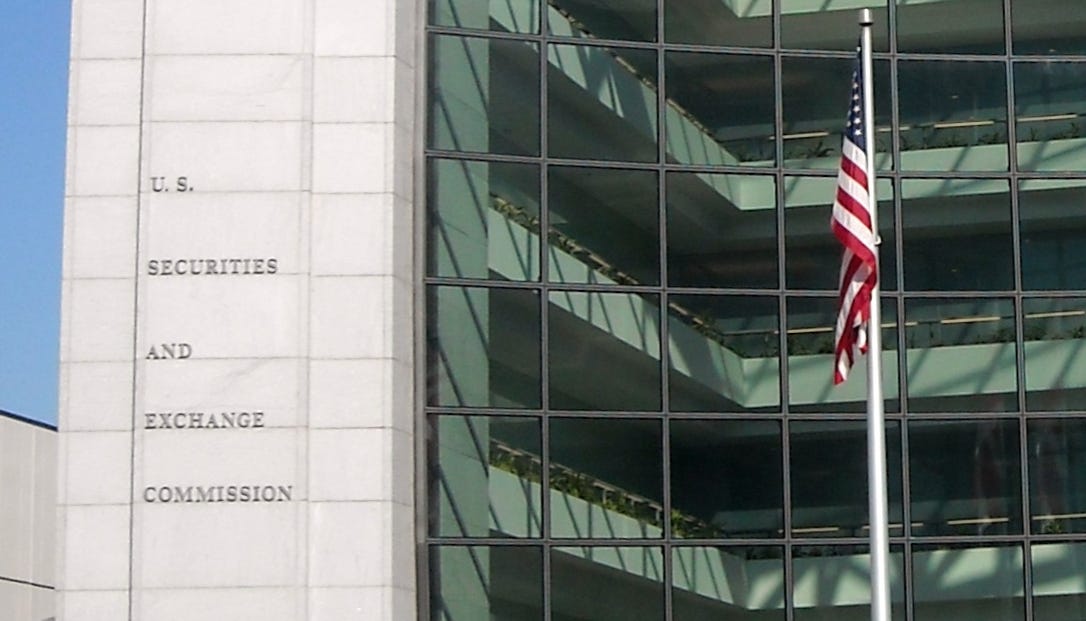The SEC and Its Relationship to Cryptocurrency
The regulatory agency sits between the U.S. government and the financial sector. It is in no rush to give up its wide discretion over the new sector of cryptocurrency.

After the Federal Reserve, the Securities and Exchange Commission (SEC) is the second-most important of the federal bureaucracies that steer the U.S. financial system. The SEC’s 4500 staff interpret and enforce regulations on the trading of financial securities, which mostly means stocks of publicly traded companies; bonds; and financial derivatives such as futures markets, credit default swaps, or many others. These markets are colossal. In 2019, the total market capitalization of all publicly traded U.S. stocks was almost $38 trillion.1 In that year the total trading volume was $23 trillion, slightly higher than the United States’ entire GDP of $21 trillion.2 In 2022 alone, the SEC issued $6.4 billion of fines across 760 “enforcement actions” in the course of regulating these markets.3
You can listen to this Brief in full with the audio player below:
Much of the SEC’s activity consists of routine regulation and enforcement, such as fining publicly traded companies which do not publish financial reports for investors as required by law, or prosecuting scams and securities fraud. The SEC has a great deal of discretion in how it interprets the regulations it is charged with enforcing, and at levels high and low its agents issue a great many “unofficial” and “non-binding” opinions which set the de facto law of the land for corporations, investors, and financiers.
In recent years, the SEC has also received a great deal of attention for its regulation of cryptocurrencies, or rather the lack thereof. Like the stocks and financial derivatives which the SEC traditionally regulates, cryptocurrencies are financial assets often used for speculation, prone to rapid swings in value, and—as demonstrated in 2022 after the collapse of the cryptocurrency exchange FTX—deeply entangled with each other and so prone to cascading crashes. In unofficial statements, the SEC has claimed that cryptocurrencies are financial securities and therefore subject to SEC registration and regulation.
It is effectively impossible for cryptocurrencies to meet these unofficial demands, but the agency has not enforced this on cryptocurrencies as a class, instead taking action only against a large handful of individual cryptocurrencies and exchanges. Some cryptocurrency developers fear that the SEC will officially declare them all illegal, and some hope that the SEC will provide legal guidance and a path towards compliance, but in either case the agency is in no rush.
The SEC sits between U.S. corporate finance and the federal government, probably the two most important and independent power centers in the United States. Both of these groups exercise some limited influence over the commission, but the SEC nevertheless maintains a great deal of independence, as a result of its internal culture and ideology, and a live tradition of knowledge.
The Commission and the Financiers

The commission has a comfortable relationship with financiers, aided by the revolving-door practice of recruiting regulators from the financial sector and eventually leaving their posts for lucrative sinecures in the companies they regulate. For example, Jay Clayton, the SEC chairman from 2017 to 2020, was in 2021 appointed to the board of Apollo Global Management, a private equity firm with half a trillion dollars under management, where he earns about half a million dollars a year.4 He simultaneously returned to the law firm he worked at before his appointment.5
The SEC has tremendous discretion in how it interprets and applies the laws that Congress has charged them with carrying out. The sheer quantity of regulations, many of them arcane or subject to illegible personal judgment, means that many financial projects, especially of complex financial derivatives, can never be completely sure that they are complying with all SEC regulations. This is often fine, because the commission has neither the obligation nor the desire to prosecute every technical violation. The agency mostly sees its mission as preventing acute fraud and systemic risk in a complex and ever-shifting environment, not as enforcing process for its own sake.
Many financiers, then, instead of seeking assurance that their actions are legal, seek assurance that they will not be prosecuted. One tool for the job is the no-action letter, a written statement that the SEC (or other government agency) does not intend to prosecute a firm for an action that is borderline or even technically illegal. The commission has a formal process for requesting no-action letters,6 and issues probably hundreds per year.7 While these letters are technically not legally binding, they are reliably honored. A no-action letter covers only the entity to which it is addressed and does not protect other firms engaging in the same behavior.
SEC attorneys, then, can use their holistic judgment about whether a firm’s overall behavior is harming the financial ecosystem, and regulators have thereby avoided the paralysis which a zealous application of the many expansive regulations would otherwise inflict on the sector they regulate, as has happened with other government agencies such as the Food and Drug Administration (FDA). This judgment necessarily comes with at least the potential for favoritism and cronyism.
The SEC does indeed have a very comfortable relationship with the financial sector. It is common for personnel to move between the SEC and the private firms they regulate, in both directions. Gary Gensler, the current chair of the commission and a former partner at the investment bank Goldman Sachs, is only the most prominent example. The SEC recruits heavily from the private law firms that handle big corporate and financial cases. A successful SEC career usually lasts about 15 to 20 years before returning to the private sector or, less frequently, moving to a different regulatory agency.8
This results in not just professional connections and personal friendships between the regulators and the financiers, but also a mixing of their cultures. Perhaps most importantly, there is a shared class interest—anything which increases the wealth, prestige, or power of financiers will have a similar effect on the wealth, power, or prestige of SEC personnel, who after all are often the same people at different stages of their career.
The SEC has little involvement with the banking crisis that began in March 2023 and saw the sudden collapse of Silicon Valley Bank. Rather, banking in the United States is mostly overseen by the Federal Reserve and the Federal Deposit Insurance Corporation (FDIC). The SEC began a probe into Silicon Valley Bank after its March 2023 collapse, but this is unlikely to be much of a factor in how events play out.9
The SEC and the Elected Government

Shocks to the U.S. stock market have often severely impacted the global real, material economy, and the SEC is tasked with keeping this under control. The agency was created by an act of Congress in 1934, in the midst of the Great Depression, which was sparked by the U.S. stock market crash of 1929. Further financial crises have led to more regulation and more responsibility for the SEC, most recently with the 2010 passage of the Dodd-Frank act in response to the 2008 stock market crash and ensuing depression.
After a financial crisis, Congress almost always passes such a financial reform bill, adding to the regulations the SEC is responsible for enforcing and also to the powers they can bring to bear in their mission. While these powers cannot prevent further crises, which are caused by credit cycles much more than by individual bad behavior, it often does enable the SEC to stop the particular form of exploitation which catalyzed the last crash.
For example, Dodd-Frank established a bounty program for whistleblowers, who are awarded between 10% and 30% of the fines the commission imposes as a result of their information—in practice, usually 30%.10 The SEC has executed this program vigorously and has expanded its scope over time.11 The agency frequently announces bounties in the tens of millions, and from the program’s inception through 2022 has paid out over $1.3 billion.12
Today, the back-and-forth between the SEC and the federal government is complex. On the one hand, the agency accepts a degree of political control from presidential administrations, who appoints the SEC’s chair and can thereby set the agency’s high-level priorities to a degree. On the other hand, the SEC and the other financial regulatory agencies have a strong hand in determining Congress’ views on finance, and even in writing financial legislation on behalf of members of Congress.
Finance carries a great mystique. Partly this is because some aspects of the system are inherently very complicated. Partly it is because clever financiers can win zero-sum contests by deliberately creating complex financial instruments which they understand better than their counterparties, whether that counterparty is a multinational corporation vulnerable to hostile takeover or a household taking on a subprime mortgage. After generations of financiers engaging in these practices, most Americans perceive finance as an arcane mystery which can be understood only by an elite few.
Even people who do not trust the financial guild’s motives defer to their judgment because they see no other credible experts who might know better. Most politicians are as dazzled by this as anyone else, and perhaps more importantly, so are the Congressional staffers who actually write legislation. Those recognized as experts—most notably the financiers themselves, financial regulators such as the SEC and the Federal Reserve, and to a lesser extent academic economists—are happy to trade on this mystique, and to tell the legislators and the public what needs to be done.
The SEC has staff permanently posted to the Senate Committee on Banking, Housing, and Urban Affairs i.e. the Senate Banking Committee, the United States’ most important legislative body on financial matters. When financial regulation is being written, Congress will often call upon personnel from the regulatory agencies to work on the text. In spite of occasional populist grandstanding, neither political party has diverged from the recommendations of the financiers in living memory.
The SEC believes that part of its role is to implement national priorities set by the President. The SEC’s chair is substantially a political appointment, and in contrast to some agencies such as the Foreign Service, the SEC’s rank-and-file generally follows the direction set from the top.13 The SEC does not have its own police officers or its own courts. It relies on the regular justice system to carry out its pronouncements. When it comes to levying punishments for violations, the SEC usually prefers hefty fines rather than prison time for all but the most egregious frauds.
The Staffing and Leadership of the SEC

The President and Congress appoint the five Commissioners who sit at the head of the SEC. While in practice these are mostly nonpartisan insiders who rose through the ranks, the crucial exception is the SEC’s chair, who is always hand-picked by the President from outside the commission. Of the other four Commissioners, currently three are long-time SEC lawyers who went through the agency’s cursus honorum—a series of different jobs and roles intended to prepare someone for greater leadership—which, at the SEC, includes working directly as counsel for a past Commissioner. The final Commissioner is a former adviser to Nancy Pelosi, the Democratic Speaker of the House. At least two Commissioners must be from each of the major political parties and the President cannot fire Commissioners, which helps the SEC keep some distance from partisan squabbling.
The current chair of the SEC is Gary Gensler. Gensler spent the first half of his career at Goldman Sachs, the second-largest investment bank in the world. In 1997, Robert Rubin, Bill Clinton’s Secretary of the Treasury and a former Goldman colleague, was Gensler’s stepping stone from practicing finance to regulating finance, bringing Gensler into the Treasury Department.14 When Clinton’s term ended, Gensler left the Treasury but stayed in politics. Over the next eight years he became a valuable operative for the Democratic Party, assisting Democratic Senators Paul Sarbanes and Tom Daschle with writing financial regulation, and campaigning for candidates in his native Maryland.15
In 2009, President Barack Obama appointed Gensler to be chairman of the Commodity Futures Trading Commission (CFTC), a separate federal agency which regulates financial derivatives alongside the SEC, where Gensler oversaw the aggressive expansion of the agency’s authority over financial derivatives under the authority of the 2010 Dodd-Frank Act which Gensler “played a hands-on role crafting,” according to the Wall Street Journal, before he stepped down in 2014.16 He was part of Joseph Biden’s Presidential transition team—a position normally given to ideological allies and insiders—and was soon appointed to his current position at the head of the SEC.
Mark Uyeda joined the SEC in 2006 and served as a high-level advisor to Commissioners and was posted to work with the Senate Banking Committee. In 2022, Uyeda was appointed Commissioner with the support of both of these groups.17 Caroline Crenshaw joined the SEC in 2013 and was appointed Commissioner in 2020, also after a career that included serving as Counsel to previous Commissioners.18
Hester Peirce joined the SEC in 2000, served as Counsel to a Commissioner and was later posted to work with the Senate Banking Committee. She left for a position at the Mercatus Center, a libertarian think tank at George Mason University. In 2015, Obama attempted to appoint her to be a Commissioner, but the Senate refused to vote on her appointment. In 2017, President Donald Trump once again nominated her, this time successfully. It is unusual for a Republican administration to actively continue the staffing policies of its Democratic predecessor; this shows that the SEC’s core longtime staff are treated as nonpartisan technocrats.
The final member of the Commission is Jaime Lizárraga. Lizárraga worked at the SEC briefly as deputy director of legislative affairs in the 1990s and later worked for the House Financial Services Committee.19 Later, he became a senior advisor to Nancy Pelosi. It was after fourteen years in that position that he was appointed to the Commission in 2022.20
The pattern of succession in the SEC’s careerist Commissioners suggests a live tradition of knowledge.21 By serving as Counsel to the current Commissioners, future prospects are given an apprenticeship and a chance to see first-hand how the SEC functions at the highest level. Many also spend time working with the Senate Banking Committee, where they can form personal relationships with these key legislators.
Lawyers form the core of the SEC staff and the SEC culture is primarily a legal one. It is mildly unusual, but not rare, for the SEC to be chaired by a banker such as Gensler rather than a lawyer. Uyeda, Crenshaw, and Peirce are all lawyers by training, with experience at large law firms in Washington, D.C. before they joined the SEC and worked their way up the ranks.
The SEC is Keeping Cryptocurrency in a Legal Gray Zone

The core question of cryptocurrency’s regulatory status is whether they are financial securities, as regulated under the Securities Act of 1933 and enforced by the SEC. Financial securities are a very broad category which includes most financial instruments, including publicly-traded stocks as well as more exotic derivatives like mortgage-backed securities and credit default swaps. A publicly-traded security is required to register with the SEC and to report financial information, in an effort to cut down on fraudulent operations and promotions. Unregistered securities, such as ownership of privately-held companies, can be traded only by accredited investors, which roughly means individuals with an annual income over $200,000 or a net worth over $1,000,000 not including their house, or else a large institution.
Only a small handful of cryptocurrencies have registered as securities and many cannot do so because of their unorthodox legal structures.22 For a project like Ethereum, for example, it is not clear who exactly would do the disclosing, since there is no developer, validator, or token holder who owns and controls the Ethereum blockchain in the way that, say, Twitter, Inc. owns and controls the Twitter website.
Nevertheless, most cryptocurrencies do appear to meet the legal definition of a financial security. And while the legal situation is not completely settled, cryptocurrencies clearly match the spirit of what the securities laws attempted to address; they are speculative financial products, often the subject of wild and unscrupulous hype, prone to crashes, and with many outright frauds mixed in among them. Both supporters and detractors have compared cryptocurrency to a financial Wild West, where the laws of the land have not yet caught up to the new frontier.23
Many leading cryptocurrency figures want new financial regulation tailored to cryptocurrency, establishing controls to prevent the numerous scams, but in ways that the new structures and technologies are capable of meeting. Formally, such regulation would need to come from Congress, unless the SEC were to make a power grab that was unusually large even by the permissive standards of U.S. government agencies, which is not impossible.
In practice, however, any eventual legislation would almost certainly be written with very heavy involvement from the regulatory agencies, much as Gensler himself was involved in writing Dodd-Frank while he chaired the CFTC. At least three of the SEC’s Commissioners, and more likely all of them, have personal relationships with the members of the Senate Banking Committee. More to the point, the SEC’s unofficial policies of what it does and does not choose to prosecute—along with the policies of other regulators such as the CFTC—already determine the de facto regulatory environment. Since there is no sign of Congressional action in the near term, the SEC is free to set its own rules.
The commission communicates its de facto policies through nonbinding channels such as interviews and speeches. Gensler has repeatedly asserted that cryptocurrencies are securities and subject to regulation and registration, with the notable exception of Bitcoin itself.24 He has taken a harder line in unofficial public statements than his predecessor Jay Clayton; for example Clayton has said that Ethereum is probably not a security,25 while Gensler has hinted that it probably is.26
These policies are not enforced universally. Rather, the SEC charges individual cryptocurrency projects with offering unregistered securities when it has some other reason it disapproves of them. This includes enforcement against the all-too-frequent cryptocurrency projects that get revealed as grossly negligent or fraudulent after they collapse, such as the SEC’s charges against the developers of TerraUSD, an ostensible stablecoin whose notorious implosion in May 2022 sparked a broader contagion of cryptocurrency markets and the collapse of several major cryptocurrency traders.27
Perhaps more significantly, the agency has also taken aim at cryptocurrencies launching “Initial Coin Offerings” (ICOs), culminating in charges against billion-dollar cryptocurrency Ripple on former Commissioner Jay Clayton’s second-to-last day in office, a suit which is still ongoing. Most cryptocurrencies that held ICOs before the crackdown got underway were not prosecuted, but nevertheless it effectively ended the large-scale use of ICOs for fundraising. ICOs are essentially sales of cryptocurrency tokens intended to raise funds for a project, similar to an initial public offering (IPO) of a company on a stock exchange.
In the first months of 2023, Gensler’s SEC brought charges against several of the biggest cryptocurrency exchanges for offering interest to users in return for loans of cryptocurrency. In January, the SEC brought such charges against Gemini, a cryptocurrency exchange, and Genesis Global Capital, which in November 2022 had stopped honoring withdrawals of the $900 million of cryptocurrency assets in their Gemini Earn program.28
In February, the SEC charged the cryptocurrency exchange Kraken, which quickly agreed to stop offering its lending product in the U.S. and pay a relatively modest $30 million fine.29 In March, the SEC sent a “Wells notice” declaring its intent to begin enforcement action against Coinbase, the largest U.S. cryptocurrency exchange by trade volume, over its lending products.30 These charges are very likely a reaction to the cryptocurrency crisis of 2022 and especially the November 2022 collapse of FTX, in which retail investors lost unknown but apparently massive sums in similar interest-bearing accounts.31 Preventing losses to individuals from the collapse of unsound but well-hyped investment schemes like FTX is arguably the most fundamental piece of the agency’s mission.
Nevertheless, it does not seem as though the SEC is preparing for a broader crackdown. The surest sign of this is in the agency’s staffing. Pursuing cryptocurrencies en masse would require a great deal of staff time and effort. From 2022 to 2023, the Enforcement Division’s Crypto Assets and Cyber Unit—formerly the Cyber Unit, founded in 2017 with cryptocurrency as a minor part of its portfolio32—grew from 30 personnel to 50, or about 1% of the SEC’s 4500 total staff.33 This is a large increase in relative terms, and its growth will likely continue, but for now this is not enough manpower to crack down on the cryptocurrency sector as a whole.
The SEC has little incentive to change this status quo, whether in the direction of systematic enforcement of their stated views on securities law, or in the direction of normalization and a path to regulatory compliance. Shutting down cryptocurrency as a whole is unappealing because regulators of powerful or important sectors gain in power and prestige, and the SEC’s profile has risen as a result of its apparent jurisdiction over this new sector. In contrast, banking regulators have been more overtly hostile to cryptocurrency.34 This is in part because if cryptocurrency developers succeed in their plans of duplicating the functions of traditional banks, then much of the de facto power that agencies like the Treasury or the FDIC hold as bank regulators would naturally migrate to the SEC as the regulator of these new institutions.
In the current situation, the SEC can govern cryptocurrency with almost no constraint. Because it has a universal pretext for enforcement and total discretion of when to enforce, the agency can effectively pick and choose which cryptocurrency projects it wants to leave active and which it wants to shutter. This arrangement allowed the commission to respond to the 2022 cryptocurrency crisis extremely quickly, shutting down lending products which the SEC believes to be similar to those responsible for the crisis within a matter of months; in contrast, after the financial crash and banking bailout of 2008, it took two years before the passage of the Dodd-Frank Act intended to address the crash’s causes, and longer for the bill’s effects to be felt. Few regulators would be eager to give up such flexibility and control.
SEC Commissioner Hester Pierce has vocally disagreed with this discretionary approach.35 She echoes the frustrations of cryptocurrency advocates who operate in the knowledge that the SEC might take action against them at any time, and believe the SEC should build regulation to meet cryptocurrencies where they are and provide a path to registration and compliance. There is no indication that the SEC is turning in this direction, however, and if anything Gensler’s public statements have moved further away from this approach.
The Financial Guild Regulates Itself

When the financiers and regulators are considered as a whole, the structure somewhat resembles a medieval guild. It is an industry that essentially regulates itself, with codes of conduct and ethical standards set and enforced largely by practitioners, who circulate freely between the private sector and the various regulatory bureaucracies. U.S. politicians exert some limited influence, especially reactively in response to crashes, but mostly they defer to the guild in how it runs its own affairs. Because of the mystique of the financial expert, politicians feel unable to write legislation on financial affairs—and not entirely without reason—and so they turn to technocrats in the regulatory agencies to do much of the heavy lifting.
The SEC’s position on cryptocurrency is in many ways downstream of the financial guild’s ambivalence towards these new assets. Financial institutions have not fully embraced cryptocurrency by any means, but they have not avoided it either. A 2021 report found that banks had invested at least $3 billion in cryptocurrency companies.36 In 2022, Goldman Sachs, where Gensler worked for eighteen years, took the collapse of FTX as an opportunity to buy up cryptocurrency companies at discounted prices, under the direction of a digital assets team of seventy people—larger than the SEC’s newly-expanded Crypto Assets and Cyber Unit.37
Around the same time, the investment bank launched a €100 million bond on a “private blockchain.”38 These cryptocurrency entanglements are relatively small; Goldman Sachs alone has $2.5 trillion of assets under management. Keeping the cryptocurrency sector at arm’s length, but not shutting it down entirely, seems in line with the wishes of the financial guild as a whole, not just the SEC.
Also like a guild, there is a tension between what is best for an individual and what is best for the industry. There is an arms race between stability and profit-seeking. No static system of law or regulation can totally prevent unscrupulous hacks; a clever and dedicated adversary will always be able to find some way to exploit a system, given a long enough time to think and experiment. Good regulation is therefore a moving target. New exploits and workarounds are always being developed, and the financial system must adapt. If Congress will not exercise that power, then the SEC’s prosecutorial discretion will fill the vacuum by default.
The status quo, in which the commission can effectively shutter any individual cryptocurrency project virtually at will, is very attractive, as it affords them a great deal of power with effectively no restrictions. The biggest threat to this status quo comes not from the cryptocurrency sector’s legal efforts or from Congress, but from the SEC’s fellow regulators at the Federal Reserve and the FDIC, who have aggressively pressured banks to decouple from cryptocurrency.39
Phil Mackintosh, “Who is Trading on U.S. Markets?”, Nasdaq, January 28, 2021, https://www.nasdaq.com/articles/who-is-trading-on-u.s.-markets-2021-01-28
“Stocks traded, total value (current US$)”, The World Bank, https://data.worldbank.org/indicator/CM.MKT.TRAD.CD?locations=US
“SEC Announces Enforcement Results for FY22”, U.S. Securities and Exchange Commission, November 15, 2022, https://www.sec.gov/news/press-release/2022-206
“Clayton will earn about $500,000 annually through equity and fees for his service, according to a regulatory filing. Such compensation is high for a lead independent director”. Noor Zainab Hussain, Jessica DiNapoli, and Chibuike Oguh, “Apollo taps ex-SEC chief Clayton in board overhaul”, Reuters, February 18, 2021, https://www.reuters.com/article/us-apollo-global-clayton/apollo-taps-ex-sec-chief-clayton-in-board-overhaul-idUSKBN2AI1HB
“Jay Clayton and Jeff Wall to Rejoin Sullivan & Cromwell”, Sullivan & Cromwell LLP, February 18, 2021. https://www.sullcrom.com/jay-clayton-and-jeff-wall-to-rejoin-sullivan-and-cromwell
For example, see https://www.sec.gov/forms/im-no-action#no-back for the Division of Investment Management’s process. Other SEC Divisions maintain separate processes for requesting no-action letters.
From October 2021 to November 2022, the SEC’s Division of Corporation Finance alone responded to 261 requests for no-action letters, and granted many of them. https://www.sec.gov/corpfin/2021-2022-shareholder-proposals-no-action#chrono Other divisions also issue no-action letters. A 1998 paper claims the SEC issued “thousands” of no-action letters yearly: https://scholarship.law.cornell.edu/cgi/viewcontent.cgi?article=2726&context=clr
The career of Robert Cohen is typical. In 2004 he joined the SEC’s Enforcement Division out of Hogan & Hartson, a major DC-based law firm. He rose through the SEC’s ranks, and in 2017 was appointed the head of the newly-formed Cyber Unit, which has since been renamed the Crypto Assets and Cyber Unit. In 2019 Cohen departed the SEC to become a partner at Davis Polk & Wardwell, where he now trades on his SEC experience and access: “He represents public companies in SEC investigations concerning disclosures, accounting and internal controls. He is an authority on cryptocurrency enforcement, having served as the first-ever Chief of the SEC’s Crypto Assets and Cyber Unit and led the SEC’s first wave of cases involving digital assets.”
“Robert A. Cohen”, Davis Polk, https://www.davispolk.com/lawyers/robert-cohen
Robert Cohen, “Robert Cohen”, LinkedIn, https://www.linkedin.com/in/robert-cohen-515a40196/details/experience/
Yun Li, “SEC and Justice Department are investigating SVB’s collapse, including insider stock sales”, CNBC, March 14, 2023, https://www.cnbc.com/2023/03/14/sec-and-justice-department-silicon-valley-bank-investigation.html
“Dodd–Frank Wall Street Reform and Consumer Protection Act, Section 922”, U.S. Securities and Exchange Commission, July 21, 2010, https://www.sec.gov/files/dodd-frank-sec-922.pdf
“SEC Amends Whistleblower Rules to Incentivize Whistleblower Tips”, U.S. Securities and Exchange Commission, August 26, 2022, https://www.sec.gov/news/press-release/2022-151
“SEC Amends Whistleblower Rules to Incentivize Whistleblower Tips”, U.S. Securities and Exchange Commission, August 26, 2022, https://www.sec.gov/news/press-release/2022-151; These announcements are cataloged at Office of the Whistleblower, “Press Releases and Statements”, U.S. Securities and Exchange Commission, https://www.sec.gov/whistleblower/pressreleases
See e.g. “Diplomacy In Crisis: The Trump Administration’s Decimation Of The State Department”, Senate Committee on Foreign Relations Democratic Staff Report, July 28, 2020, https://www.foreign.senate.gov/imo/media/doc/Diplomacy%20in%20Crisis%20--%20SFRC%20Democratic%20Staff%20Report.pdf for an account of the Trump administration’s efforts to control the State Department, and the conflict between longtime staff and the administration’s political appointees at the top. There are no equivalent accounts of either party’s political appointees to the SEC having similar struggles with the longtime staff.
Paul Wiseman, “CFTC chief Gary Gensler is out to police financial Wild West”, USA Today, November 23, 2009, http://usatoday30.usatoday.com/money/companies/management/profile/2009-11-23-gensler23_CV_N.htm
Julie Hirschfeld Davis, “The Democrats' stealth fighter”, The Baltimore Sun, November 3, 2002, https://web.archive.org/web/20141030002444/http:/articles.baltimoresun.com/2002-11-03/news/0211030157_1_gensler-democratic-campaigns-baltimore-county
Scott Patterson And Jamila Trindle, “Gensler to Step Down as CFTC Chairman”, The Wall Street Journal, October 3, 2013, https://www.wsj.com/articles/gensler-to-step-down-as-cftc-chairman-1380822547
Abby Sharpe, “Mark Uyeda (B’92) Brings Years of Experience and Connections as New SEC Commissioner”, Georgetown University McDonough School of Business, October 4, 2022, https://msb.georgetown.edu/news-story/mark-uyeda-b92-brings-years-of-experience-and-connections-as-new-sec-commissioner/
“President Donald J. Trump Announces Intent to Nominate Individual to a Key Administration Post”, Trump White House Archive, June 18, 2020, https://trumpwhitehouse.archives.gov/presidential-actions/president-donald-j-trump-announces-intent-nominate-individual-key-administration-post-23/
Kate Davidson, “What’s making investor advocates uneasy”, Politico, March 24, 2022, https://www.politico.com/newsletters/morning-money/2022/03/24/whats-making-investor-advocates-uneasy-00019948
Ibid.
Samo Burja, “On the Loss and Preservation of Knowledge”, March 18, 2022, https://samoburja.com/on-the-loss-and-preservation-of-knowledge/
Matt Levine, “The SEC Gets a Token Fight”, Bloomberg Opinion, January 28, 2019, https://archive.is/IuBdA
Gensler has made the comparison several times, e.g. at Gary Gensler, “Remarks Before the Aspen Security Forum”, U.S. Securities and Exchange Commission, August 3, 2021, https://www.sec.gov/news/speech/gensler-aspen-security-forum-2021-08-03.
Brian Armstrong, CEO of the Coinbase cryptocurrency exchange, responded that “The "wild west" is a badge of honor, because it is where opportunity and growth reside.” Brian Armstrong, Twitter, October 12, 2021,
https://twitter.com/brian_armstrong/status/1448053743849664512
Do Kwon, CEO of the company which created the crashed TerraUSD and Luna cryptocurrencies, has used the comparison as well. Jordan Major, “Do Kwon goes public in his first interview since Terra’s $45 billion collapse”, Finbold, August 15, 2022, https://finbold.com/do-kwon-goes-public-in-his-first-interview-since-terras-45-billion-collapse/
“Of the nearly 10,000 tokens in the crypto market, I believe the vast majority are securities.” Gary Gensler, “Kennedy and Crypto”, U.S. Securities and Exchange Commission, September 8, 2022, https://www.sec.gov/news/speech/gensler-sec-speaks-090822
Adrian Zmudzinski, “US SEC Chairman Jay Clayton Confirms ETH Is Not a Security”, Cointelegraph, March 12, 2019, https://cointelegraph.com/news/us-sec-chairman-jay-clayton-confirms-eth-is-not-a-security
Cheyenne Ligon, “SEC Chairman Gensler Suggests Again That Proof-of-Stake Tokens Are Securities: Report”, CoinDesk, March 15, 2023, https://www.coindesk.com/policy/2023/03/15/sec-chairman-gensler-suggests-again-that-proof-of-stake-tokens-are-securities-report/
“SEC Charges Terraform and CEO Do Kwon with Defrauding Investors in Crypto Schemes”, U.S. Securities and Exchange Commission, February 16, 2023, https://www.sec.gov/news/press-release/2023-32
Ephrat Livni, “S.E.C. Charges Crypto Companies With Offering Unregistered Securities”, The New York Times, January 12, 2023, https://www.nytimes.com/2023/01/12/technology/sec-crypto-gemini-genesis.html
Rohan Goswami and MacKenzie Sigalos, “Crypto exchange Kraken settles with SEC for $30 million, will close U.S. staking operation”, CNBC, February 9, 2023, https://www.cnbc.com/2023/02/09/crypto-exchange-kraken-settles-with-sec-over-us-staking-operation.html
MacKenzie Sigalos, “Coinbase warned by SEC of potential securities charges,” CNBC, March 22, 2023, https://www.cnbc.com/2023/03/22/coinbase-warned-by-sec-of-potential-securities-charges.html
The New York Times reports that FTX owes “as much as $8 billion”. The share of this owed to retail customers, as opposed to institutional investors, is unclear. David Yaffe-Bellany, “Embattled Crypto Exchange FTX Files for Bankruptcy”, The New York Times, November 11, 2022, https://www.nytimes.com/2022/11/11/business/ftx-bankruptcy.html
“SEC Announces Enforcement Initiatives to Combat Cyber-Based Threats and Protect Retail Investors”, U.S. Securities and Exchange Commission, September 25, 2017, https://www.sec.gov/news/press-release/2017-176
Two years later, cryptocurrency had grown to become the headline item in descriptions of the Cyber Unit’s portfolio, as seen in “Robert A. Cohen, Cyber Unit Chief, to Leave SEC After 15 Years of Service”, U.S. Securities and Exchange Commission, July 29, 2019, https://www.sec.gov/news/press-release/2019-142
Jesse Hamilton, “US SEC Plans to Keep Growing Crypto Unit as Enforcement Ramps Up”, CoinDesk, March 1, 2023, https://www.coindesk.com/policy/2023/03/01/us-sec-plans-to-keep-growing-crypto-unit-as-enforcement-ramps-up/
Nic Carter, “Operation Choke Point 2.0 Is Underway, And Crypto Is In Its Crosshairs”, Pirate Wires, February 8, 2023, link.
See for example Hester M. Pierce, “On the Spot:
Remarks at “Regulatory Transparency Project Conference on Regulating the New Crypto Ecosystem: Necessary Regulation or Crippling Future Innovation?”” U.S. Securities and Exchange Commission, June 14, 2022,
https://www.sec.gov/news/speech/peirce-remarks-regulatory-transparency-project-conference
Carla Mozée, “These 13 banks have invested the most in crypto and blockchain to date”, Business Insider, August 15, 2021, https://markets.businessinsider.com/news/currencies/13-top-banks-investing-cryptocurrency-blockchain-technology-funding-blockdata-bitcoin-2021-8
Iain Withers and Lawrence White, “Exclusive: Goldman Sachs on hunt for bargain crypto firms after FTX fiasco”, Reuters, December 6, 2022, https://www.reuters.com/technology/goldman-sachs-hunt-bargain-crypto-firms-after-ftx-fiasco-2022-12-06/
“EIB launches second euro digital bond with Goldman, SocGen”, Reuters, November 29, 2022, https://www.reuters.com/markets/rates-bonds/eib-launches-second-euro-digital-bond-2022-11-29/
This pressure has taken many forms, from public statements like the “Joint Statement on Crypto-Asset Risks to Banking Organizations”, Board of Governors of the Federal Reserve System, Federal Deposit Insurance Corporation, and Office of the Comptroller of the Currency, January 3, 2023, https://www.fdic.gov/news/press-releases/2023/pr23002a.pdf, to private conversations with bankers discouraging them from serving cryptocurrency companies. Examples are cataloged more extensively at Nic Carter, “Operation Choke Point 2.0 Is Underway, And Crypto Is In Its Crosshairs”, Pirate Wires, February 8, 2023, link.

